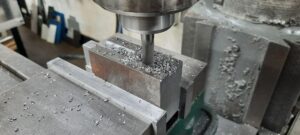Team #7 Bariatric Rollator
Bariatric Rollator Seat Lift Device
The healthcare and rehabilitation industry encounters numerous back injuries in healthcare professionals and patients every year due to the lack of lifting devices. Spinal injuries that occur by lifting large amounts of weight, such as assisting a person to stand, can severely damage a person’s bone structure and back muscles. This damage can cause permanent issues unseen to the naked eye. These types of injuries can occur in many different cases, such as lifting a patient out of bed, rotating a person into a wheelchair, or assisting a person into an upright position after being seated in a walker. To correct and counter these issues, the task at hand is to design and fabricate a device that will primarily focus on the up righting of a person into the standing position by modifying a bariatric rollator. The device will be designed so that the least amount of effort is needed to stand completely. By reducing the required lifting weight by 50%, the amount of severe injuries will decrease exponentially. The maximum weight to be accounted for is 500 lbs.
[SlideDeck id=6874]
Team Members
Ben Richardson:

Ben is a senior in the Mechanical Engineering Technology program at the University of Maine. His background through high school and trade school has mainly been focused on manufacturing and the manufacturing process. During high school he attended the local vocational school in the Metals Manufacturing program. Upon completion of this training, he started his post high school education at Kennebec Valley Community College in the Precision Machining Technology Program where he studied the manufacturing process and how to fabricate. After a few years practicing as a machinist, he then reapplied to the University of Maine where he has been enrolled since the Spring semester of 2018.

Patrick Sugar:
Patrick is a senior in the Mechanical Engineering Technology program at the University of Maine. From a young age he showed a great interest in the technology used in sci-fi wanting to push the worlds current technology closer to the ones shown on screens, this led to his decision to become an engineer. Graduating from North Middlesex Regional High School in 2017 he then went to the University of Maine that following fall.
Lucas Scher:
Lucas Scher is originally from North Georgia and was looking to branch out from his home town which landed him in Maine. Upon graduating from the University of Maine with a degree in Mechanical Engineering Technology, he will commission into the Marine Corps as an officer. He hopes to one day use his degree to own his own custom motorcycle shop.
Weekly Updates
4-26-2021 This week the team focused on optimizing the design. An enclosure was purchased and installed. All deliverables have been met, successfully completing the project.
4-19-2021 During the final construction, the team accidently sent a 12v charge back to the Arduino causing a breakage. A new one was purchased and is currently in the mail. Regardless of this set back, the team has completed the final fitment of all other parts of the rollator and just awaiting the arrival of the new micro controller.
4-12-2021 The team has successfully tested the electronics as well as the soldering and custom wire making. The team is currently 3D printing the remaining parts.
4-5-2021 The rollator has successfully been tested with in its required weight range. The team will now focus on electronics and finishing touches
3-15-2021 The team has began machining all of the attachment parts and components to support the actuator.
2-15-2021: The team has chosen a linear actuator for the lifting mechanism. The option though more expensive then the jacks, is self contained and water resistant.
1-31-2021: After a meeting with the client, the team has adjusted the design to only allow for tilt. The previous design of lifting and tilting simultaneously posed possible risk for users who are of smaller stature. The team also has determined the primary lifting devices and will move to acquire them in the next week.
12-7-2020: The team did experiments this week to determine the required torque for the motor powering the lift mechanism. The team also received the parent rollator and will begin testing and fitting of the device in the coming months.
11-16-2020: The team is narrowing down electric motors to power the lifting mechanism as well as the shaft design to be used. As of today, the team has a lender for a bariatric rollator to use as reference for measurements and constraints.
11-2-2020: To date, the team has been working on the overall design and analysis of the bariatric rollator. The team decided that the most economic and compact lifting mechanism would be a scissor jack. The team is currently focusing on the method in which the seat will tilt.
Customer Advisor

Susan A. Tardiff, MSN, RN Peter Howorth
Director of Academic Advisory and Progression, Lecturer of Nursing Assistant Professor of Mechanical Engineering Technology
susan.tardiff@maine.edu peter.howorth@maine.edu
207.581.2594

